There have been three Covid-19-related deaths and 1,205 new cases of the virus notified to the Department of Health in the past 24 hours.
This is the highest number of cases recorded in a single day since the start of the pandemic.
It brings the total number of Covid-19 cases here to 46,429. This includes the denotification of 19 previously confirmed cases. The death toll stands at 1,838.
The number of people in ICU as of 2pm today was 29, one less than yesterday. There have been 24 additional hospitalisations in the past 24 hours.
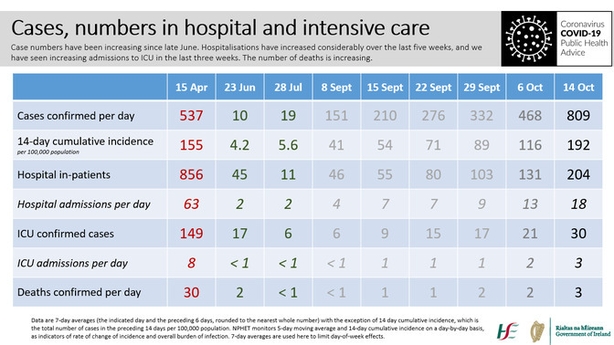
It is lowest in Wicklow (77.9), Tipperary (79), Waterford (82.6), Carlow (84.3) and Mayo (106.5).
Dublin has a rate of 194.1, in Cork it is 232.3 with Limerick at 207.3 and a rate of 203.4 in Galway.
Of the new cases notified today, 288 were in Dublin, 173 in Cork, 123 in Meath, 97 in Galway 63 in Cavan and the remaining 461 cases are spread across all remaining counties.
The five-day average number of new cases nationally per day is 947.
"Over the last week to ten days we've seen little evidence of any improvement in the trajectory of the disease," Prof Philip Nolan says, adding that "the epidemic has accelerated further in the last week" | #Covid19 | https://t.co/bXHSGf30fT pic.twitter.com/1TuKYyMlZm
— RTÉ News (@rtenews) October 15, 2020
Chief Medical Officer Dr Tony Holohan said that nationally, the 14-day incidence was now at 206.7 per 100,000 population, the highest ever recorded here.
"There has been further increases across all key indicators of Covid-19 and the growth rate of the epidemic has accelerated since the National Public Health Emergency Team (NPHET) last met.
"Cases notified over the past week have increased by 82% compared with the previous seven days, from 3,514 to 6,382 cases.
"The positivity rate over the past seven days is now 6.2% and is continuing to increase.
"The 14-day incidence in those aged 65 years and older has increased from 92.9 per 100,000 population on 7 October to 125 per 100,000 population on the 14 October.
"The number of hospitalisations are increasing faster than the exponential growth modelling predicted. This indicates a rapidly deteriorating disease trajectory nationally."
Dr Holohan, asked about people living alone, said NPHET was considering this situation. They are looking at the international evidence around the creation of 'social bubbles'.
"We recognise the challenge [living alone] represents. We need to look at this and provide more guidance to address their concerns."
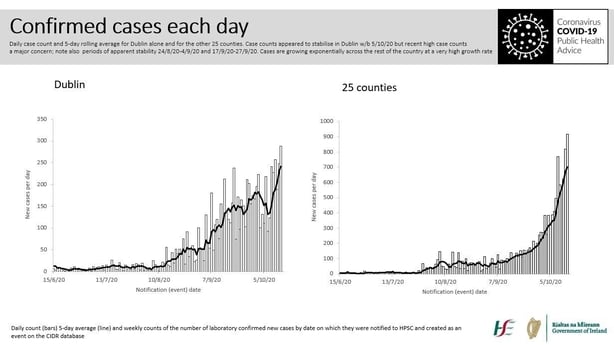
Why airborne transmission of Covid-19 will increase this winter
Interactive map: Covid-19 cases in your area
At a glance: What does Level 4 mean?
Dr Holohan said with the scale of infection now meant that a large proportion of the virus could not be identified, mapped and contact traced due to widespread community transmission.
It was "beyond the capacity or level of resources" to do so. "Mapping those things reliably can no longer be seen as an objective."
Professor Philip Nolan, chair of the NPHET Irish Epidemiological Modelling Advisory Group, said if you "look back two to four weeks, there has roughly been a fourfold increase over that period of time".
He said there is concern the virus spread has accelerated even further this week. There has been an average of three deaths a day in the past week.
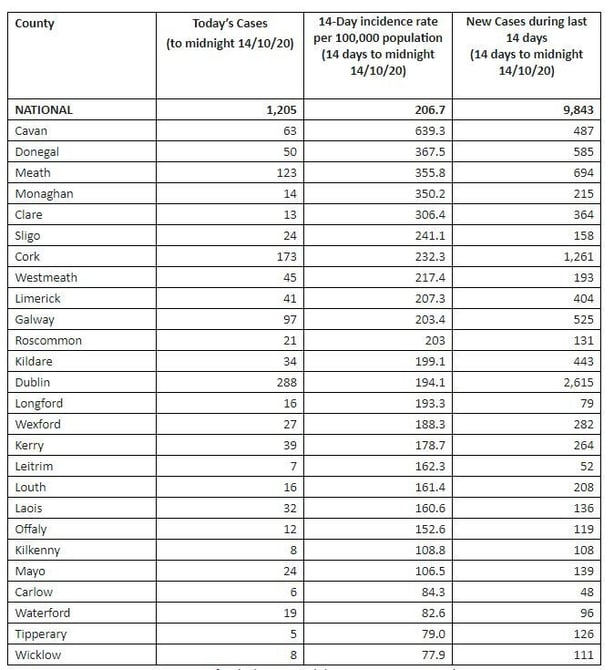
He said the stabilisation in Dublin has paused - cases are rising again but not as as fast as the rest of the country.
The incidence in older people, those aged over 65, has increased two and three fold in just one week.
Prof Nolan said the R (reproductive number) is now around 1.4 nationally, up from last week's 1.2. "It might be around 1 in Dublin but elsewhere it could be as high as 1.8."
He said NPHET was predicting between 1,800 and 2,500 cases per day by 31 October [at current growth rates] and more than 400 people in hospital by that date.
"But we can get on top of this quicker than we might think," he told a press briefing, if people follow the public health guidelines and "the number of infected people starts shrinking".
It is all about being persistent over a number of weeks, he added. "Without constant reminding and support, it is hard to remember all the rules."
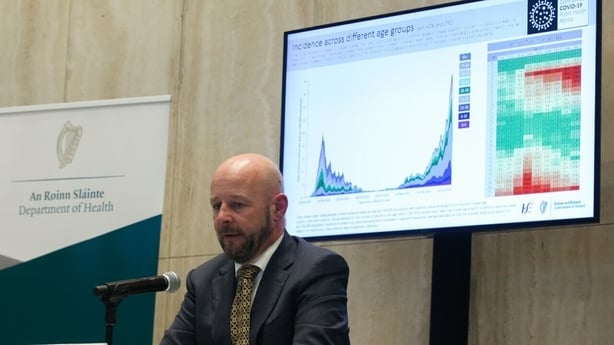
Dr Colm Henry, Chief Clinical Officer, HSE said the data showed that around 384 schools have had cases of the disease with 9,000 young people tested.
There was a positivity rate from those tests of just 1.9% with "very little evidence of onward transmission" from cases among children.
Deputy Chief Medical Officer, Dr Ronan Glynn, said NPHET was "clearly very concerned" at all the indications - from the rise in deaths and hospitalisations to the exponential growth in the number of cases.
"Think about the thousands of vulnerable people who are depending on you to do a little bit more," he said.
For example, meeting three different people for three different coffees is giving the virus three chances to spread. Dr Glynn urged people to cut back on their social contacts.
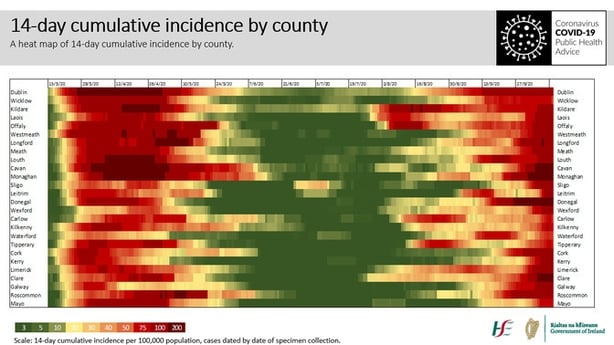
He also said they were still hearing of people ringing their GP from their workplace with Covid symptoms. "It is simply not acceptable to go to work if you are not feeling well."
Dr Glynn also revealed that data looking at traffic flow, public transport usage and bank card transactions show "there has not been an appreciable decrease" in these kinds of activity, despite the latest restrictions.
Earlier today, HSE Chief Executive Paul Reid said there was a "concerning growth" in the number of people being admitted to hospital for treatment for Covid-19.
He also said the number of people in hospital who are requiring ventilation as a result of Covid-19 has increased in the last few days.
There have been 763 new Covid-19 cases in Northern Ireland in the last 24-hour reporting period, bringing the total to 23,878. There were four deaths reported, taking the official toll to 606.
"If we fail to reduce transmission now, we're on track to see 1,800-2,500 cases a day and over 400 people in hospital by the end of this month" Prof Philip Nolan sets out some data on #Covid19 trends | https://t.co/bXHSGf30fT pic.twitter.com/GNkw8GvkxF
— RTÉ News (@rtenews) October 15, 2020
Meanwhile, Higher Education Minister Simon Harris said the country is at a watershed moment and warned there is a "very, very small window where we can stop us having to go back to severe restrictions".
However, he said, is "it is not inevitable" that more severe Covid-19 restrictions could be imposed.
Speaking on RTÉ's Today with Claire Byrne, Mr Harris said he believes that the prohibition of household visits will be "a gamechanger" in curbing the spread of Covid-19.
He also said that tradespeople can continue to work in people's homes under new restrictions announced by the Government last night.

